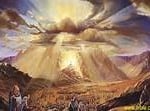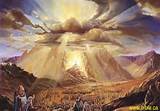Moshe Kempinski
 We are approaching the festival of Shavuot. In Jewish understanding each festival is not just a memory of what was but rather a re-experiencing the spiritual power of that day. We read the following ” Speak unto the children of Israel, and say unto them: The appointed seasons ( Moadei ) of Hashem, which you shall proclaim to be callings of holiness (mikraei kodesh), even these are My appointed seasons (moadai).” ( Leviticus 23:2) .
We are approaching the festival of Shavuot. In Jewish understanding each festival is not just a memory of what was but rather a re-experiencing the spiritual power of that day. We read the following ” Speak unto the children of Israel, and say unto them: The appointed seasons ( Moadei ) of Hashem, which you shall proclaim to be callings of holiness (mikraei kodesh), even these are My appointed seasons (moadai).” ( Leviticus 23:2) .
What then does the term Mikraei Kodesh truly mean? The Baal HaTanya understands the term” Mikraei Kodesh “literally, to mean a ”Calling of Holiness ”. He understands each festival as a gateway in the passage of time at which we are given the power to “call forth” the specific spark of spirituality and holiness ensconced within this appointed time. So we prepare to re-experience the receiving of Hashem’s Torah. So what then can we learn from the experience of the Israelites as they prepared for that dramatic and momentous stand at Mount Sinai.
Upon the return of the people of Israel to the land after exile, Ezra the scribe instituted many critical and constructive statutes and decrees.One such declaration decreed that in the weekly reading of the Torah portion the portion of Bamidbar (in the wilderness) would always precede the festival of Shavuot ( Pentecost), the festival commemorating the revelation of G-d at Mount Sinai. One must ask why would that would be so.
On the first level we note that the book of Bamidbar ( in the Wilderness)or “Numbers” is the book describing the wilderness experience of the newly emerging people of Israel. It describes their challenges and their failures on the one hand and their persistence and courage on the other. As with all the words of Torah it also remains as an eternal guide for the generations that will follow. Each generation with its own unique wilderness experience.
The Midrash (Numbers Rabbah 1:7) teaches that the wilderness the perfect place of G-d’s revelation. The wilderness speaks loudly. The Hebrew word for wilderness or desert “Midbar“ actually is made up of the same letters as Midaber (speaking). From within the stillness and quietude of the wilderness much is heard.
The wilderness is a place of great trial and struggle and humility. It is also a place of great inner revelation. In the book of Hoshea we see Hashem using the wilderness as a place of chastisement and punishment;
“…..and make her as a wilderness, and set her like a dry land, and slay her with thirst”( Hoshea 2:5).
Yet after that experience of testing we read the following in the same chapter;
“Therefore, behold, I will allure her, and bring her into the wilderness, and speak tenderly unto her.“(ibid:16).
It is in the wilderness that Hashem’s tender words will be heard.
It is that experience that Hashem remembers fondly “Go, and cry in the ears of Jerusalem, saying: Thus said Hashem: I remember for thee the affection of your youth, the love of your espousals; how you went after Me in the wilderness, in a land that was not sown.” ( Jeremiah 2:1-2)
These then are but some of the attitudes and lessons needed to be acquired before entering the festival of Shavuot.
But the book of Bamidbar( “In the wilderness”) is also called “Sefer Hapekudim, the Book of Counting”. We read ,”Take the sum of all the congregation of the children of Israel, by families following their fathers’ houses; a head count of every male according to the number of their names.” (Numbers 1:1-2)
The Midrash Rabba explains that in fact there were to be ten such “countings” . Why must Hashem make a point of counting His people again and again and why must we be told of those census ?
Rashi explains that this was so because of “G-d’s great love for His people, He counts them all the time.” Just as one who counts his prized possessions again and again out of affection. We are then told “As Hashem commanded Moses, so did he count them (Vayifkidem) in the Sinai desert.” (Ibid: 19)
Yet the choice of the word “pakod” rather than the more commonly used Hebrew words “Sofer” or “Moneh”, is not happenstance. Pakod is actually a code word pointing to redemption. When Joseph was on his death bed he relates these words to his brothers, knowing that they were about to enter a period of deep exile and bondage. On his deathbed, Joseph said to his brothers, the following “And Joseph said unto his brethren: ‘I die; but G-d will surely remember you’ (pakodyifkod etchem), and bring you up out of this land unto the land which He swore to Abraham, to Isaac, and to Jacob.” Genesis50:24.25).
It was a code word the enslaved people of Israel understood;
“And Aaron spoke all the words which Hashem had spoken unto Moses, and did the signs in the sight of the people. And the people believed; and when they heard that Hashem had remembered (PAKAD) the children of Israel, and that He had seen their affliction, then they bowed their heads and worshipped. ( Genesis 4: 30.31)
One of the possible understandings of the word Pakod is revealed in the book of Samuel. When David is concerned lest King Saul attempts to kill him he decides to go into hiding. He tells his close friend Yonatan, the son of Saul, what to say if his absence at the feast of the new month will be noticed ;
“If your father miss me at all (Pakod Yifkideni), then say: David earnestly asked leave of me that he might run to Bethlehem his city; for it is the yearly sacrifice there for all the family. (I Samuel 20:6)
The word Pakod does not only mean “to count” but to also to make sure that nothing is missing. It is more than counting “what is”. It is about ensuring that all that needs to be there is accounted for as well. Hashem is telling Moshe, in this Torah portion, not only to count his people but to account for them all as well. No one is to be left out.
This then is the secret of being vessels for Hashem’s revelation. Humility, yearning and coming together as one people. When the people arrived at Mount Sinai we read the following “… and Israel encamped ( VaYichan written in the singular) there opposite the mountain.”( Exodus 19:2)
Rashi there explains” the verb is in the singular form, denoting that they encamped there as one man with one heart”
We approach the festival with the hope that we at least yearn for that oneness as one soul and that we do so in humility a desire to truly listen.
Chag sameach.
LeRefuat Yehudit bat Golda Yocheved
